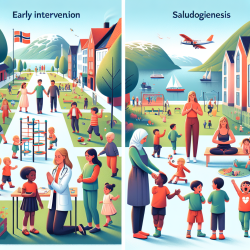Introduction
In the ever-evolving landscape of public health, especially within diverse communities, the integration of effective early intervention programs is paramount. A recent study conducted in Norway offers groundbreaking insights into developing a salutogenic early intervention home visiting program, specifically tailored for a multiethnic population. This research, conducted within the framework of Norway's public child health services, provides a blueprint for practitioners aiming to enhance child health outcomes through culturally appropriate interventions.
The "New Mothers" Program: A Salutogenic Approach
The "New Mothers" program, as detailed in the study, is built on the salutogenic theory, which emphasizes the strengths and resilience of individuals rather than focusing solely on risk factors. This approach is particularly beneficial in diverse communities where traditional risk-focused models may not adequately address the unique cultural and social dynamics at play.
Public health nurses (PHNs) play a crucial role in this program, offering home visits to all first-time mothers from gestational week 28 until the child reaches two years of age. The use of motivational interviewing and empathic communication techniques helps mothers identify their strengths and resources, fostering a supportive environment for both mother and child.
Formative Research: A Mixed-Method Mastery
The study utilized a mixed-method formative research approach, ensuring that data from various sources were incorporated into the program's development. This method secured cultural and system-level appropriateness, a critical factor in multiethnic settings. Monthly feedback loops with the project group allowed for iterative improvements, ensuring the program remained relevant and effective.
Implications for Practitioners
For practitioners, the key takeaway from this research is the importance of adopting a salutogenic framework when developing early intervention programs. This approach not only reduces stigmatization but also empowers families by focusing on their inherent strengths. Practitioners are encouraged to incorporate user involvement at all stages of program development, ensuring that interventions are culturally sensitive and contextually relevant.
Moreover, the study highlights the value of home visits as an intervention setting. By meeting families in their own environment, practitioners can gain deeper insights into the family's dynamics and needs, facilitating more personalized and effective support.
Encouraging Further Research
While the "New Mothers" program offers a robust model for early intervention, it also opens avenues for further research. Practitioners are encouraged to explore how these principles can be adapted to different cultural contexts and health systems. Additionally, longitudinal studies could provide valuable insights into the long-term impacts of such programs on child health outcomes.
Conclusion
The development of the "New Mothers" program serves as a testament to the power of formative research and salutogenic theory in crafting effective early intervention strategies. By focusing on strengths and fostering user involvement, practitioners can create programs that not only meet the immediate needs of families but also contribute to long-term health and well-being.
To read the original research paper, please follow this link: Formative research in the development of a salutogenic early intervention home visiting program integrated in public child health service in a multiethnic population in Norway.










